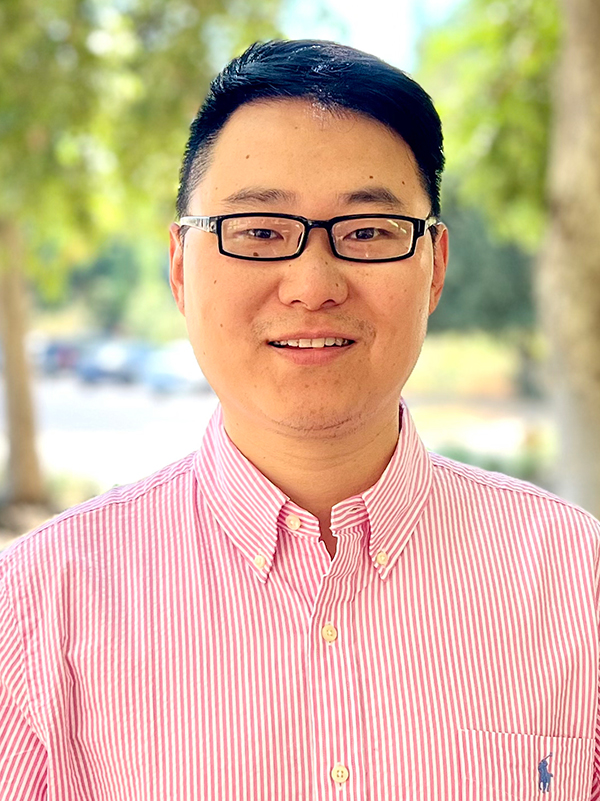- Y7705, Yellow Zone, 7/F Yeung Kin Man Academic Building
- +852 3442-8649
- +852 3442-0549
- yuxsun@cityu.edu.hk
- CityU Scholars
- Lab Website
Prof. Yuxiang Sun received his BSc in Biotechnology from Anhui University and PhD in Biophysics from University of Chinese Academy of Sciences, where his research uncovered the disruption of chromosomal architecture at the COX2 locus, sensitizing lung cancer cells to radiotherapy. He completed postdoctoral training at UC Riverside, focusing on RNA modifications in trinucleotide repeat expansion disorders, employing molecular and cell biology, neuroscience, and mass spectrometry-based bioanalytical chemistry. In 2024, he has joined the Department of Neuroscience at City University of Hong Kong.
Research Interests
Epigenetic modifications occur on genomic DNA and histones to influence gene expression. His research interests are investigating roles of epigenetic regulation in gene expression and epitranscriptomic modulation in driving neurodegeneration.
- Having elucidated the critical role of RNA modifications in neurological diseases caused by CAG repeat RNA expansions, he aims to further explore epitranscriptomic modifications in various RNA repeat expansions associated with neurodegenerative diseases. This exploration seeks to identify effective molecular targets for developing therapeutic approaches.
- Recognizing the significant role of non-canonical repeat-associated non-AUG (RAN) translation in inducing neurotoxicity and neurodegeneration, his work will investigate how modified nucleosides in expanded repeat RNA influence RAN translation. Additionally, he will assess how RNA-modifying enzymes regulate RAN translation products. This ongoing research aims to provide new mechanistic insights into RAN translation, documenting the roles of RNA modifications and revealing additional pathological implications of epitranscriptomic modifications in neurodegenerative diseases.
- Given the demonstrated toxicity of RAN proteins in cellular and animal models, his research will utilize the ascorbate peroxidase (APEX)-based proximity labeling method to analyze the interactomes of RAN proteins. By identifying novel interaction partners of these proteins, his goal is to gain mechanistic insights into their toxicity, particularly their sequestration of RNA-binding proteins, which may contribute significantly to disease etiology.
Publication List
- Yuxiang Sun*, Hui Dai*, Xiaoxia Dai, Jiekai Yin, Yuxiang Cui, Xiaochuan Liu, Gwendolyn Gonzalez, Jun Yuan, Feng Tang, Nan Wang, Alexandra E. Perlegos, Nancy M. Bonini, X. William Yang, Weifeng Gu, Yinsheng Wang. m1A in CAG repeat RNA binds to TDP-43 and induces neurodegeneration. Nature, 2023, 623, 580-587.
- Xiaochuan Liu, Gwendolyn Gonzalez, Xiaoxia Dai, Weili Miao, Jun Yuan, Ming Huang, David Bade, Lin Li, Yuxiang Sun, Yinsheng Wang. Adenylate kinase 4 modulates the resistance of breast cancer cells to tamoxifen through an m6A-based epitranscriptomic mechanism. Molecular Therapy, 2020, 28, 2593-2604.
- Yuxiang Sun, Hui Dai, Shaopeng Chen, Yajun Zhang, Tao Wu, Xianbin Cao, Guoping Zhao, An Xu, Jun Wang, and Lijun Wu. Disruption of chromosomal architecture of cox2 locus sensitizes lung cancer cells to radiotherapy. Molecular Therapy, 2018, 26, 2456-2465.
- Yuxiang Sun*, Hui Dai*, Shaopeng Chen, Ming Xu, Xuanyu Wang, Yajun Zhang, Shengmin Xu, An Xu, Jian Weng, Sijin Liu, Lijun Wu. Graphene oxide regulates cox2 in human embryonic kidney 293T cells via epigenetic mechanisms: dynamic chromosomal interactions. Nanotoxicology, 2018, 12, 117-137.
- Hui Dai, Yun Liu, Jingjing Wang, Yaguang Nie, Yuxiang Sun, Mudi Wang, Dayan Wang, Zhen Yang, Lei Cheng, Juan Wang, Jian Weng, Qiuquan Wang, Fangyue Wang, Lijun Wu, Guoping Zhao and An Xu. Graphene oxide antagonizes the toxic response to arsenic via activation of protective autophagy and suppression of the arsenic-binding protein LEC-1 in Caenorhabditis elegans. Environmental Science: Nano 2018, 5, 1711-1728.
- Huadong Fan, Shaopeng Chen, Yuxiang Sun, Shaohai Xu, Lijun Wu. Seipin mutation at glycosylation sites activates autophagy in transfected cells via abnormal large lipid droplets generation. Acta Pharmacologica Sinica, 2015, 36, 497–506.
- Shaohai Xu, Shengmin Xu, Shaopeng Chen, Huadong Fan, Xun Luo, Yuxiang Sun, Jun Wang, Hang Yuan, An Xu, Lijun Wu. The acidic transformed nano-VO2 causes macrophage cell death by theinduction of lysosomal membrane permeabilization and Ca2+ efflux. Toxicology Reports, 2015, 2, 870-879
- Jing Yu, Qisen Wang, Ni Chen, Yuxiang Sun, Xiaofei Wang, Lijun Wu, Shaopeng Chen, Hang Yuan, An Xu, Jun Wang. Mitochondrial transcription factor A regulated ionizing radiation-induced mitochondrial biogenesis in human lung adenocarcinoma A549 cells. Journal of Radiation Research, 2013, 54, 998-1004.
19 August 2024
